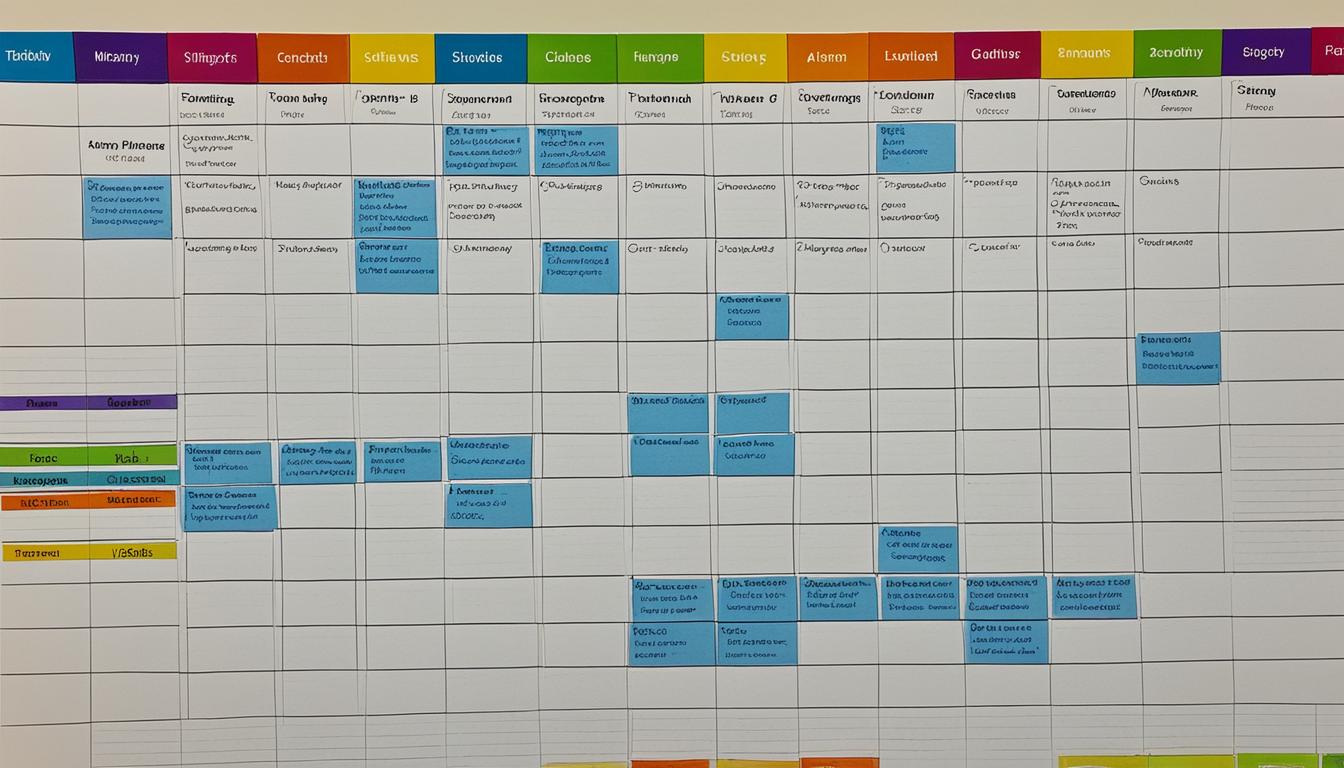When it comes to choosing classes and planning your ideal schedule, it’s essential to consider several factors that contribute to your academic success and personal fulfillment. From the selection of courses to the timing of classes, each decision plays a crucial role in shaping your college experience.
In this article, we will explore the steps and considerations involved in creating an optimal class schedule that meets your needs and goals. Whether you’re a freshman just starting your academic journey or a senior looking to make the most of your final year, this guide will provide valuable insights to help you navigate the process.
Choosing the right classes is the foundation of designing your ideal schedule. By selecting courses that align with your academic goals and personal interests, you can create a meaningful and enriching learning experience.
Stay tuned as we dive deeper into the factors to consider when choosing classes, how to create a balanced schedule, and utilizing class times effectively. We’ll also explore the support available to you, such as guidance from academic advisors and online learning options. Let’s embark on this journey together to create a schedule that sets you up for success!
Factors to Consider When Choosing Classes
Before diving into the process of scheduling your classes, it’s important to consider several factors that will contribute to your academic success. By carefully selecting your classes, you can align your academic goals and personal interests, ensuring that each course you take brings you closer to achieving your degree requirements.
First, think about your academic goals and the specific courses you need to fulfill your degree requirements. Consider any prerequisites or core courses that must be completed in a specific order and prioritize them accordingly. By understanding the course requirements early on, you can plan your schedule more effectively.
Additionally, think about your personal interests and passions. Take the opportunity to explore subjects that genuinely fascinate you. By selecting classes that align with your interests, you not only increase your enjoyment of the coursework but also pave the way for a future career path that you are genuinely excited about.
Remember that class selection is more than just ticking boxes; it should be an intentional process. Take the time to research each course, read course descriptions, and look into the professors who teach them. Gathering as much information as possible will help you make informed decisions that lead to a fulfilling and well-rounded academic experience.
As you navigate the class selection process, keep your academic advisor in the loop. They can provide additional insights and guidance based on their expertise and knowledge of your academic program. Collaborating with your academic advisor will help ensure that your choices align with your academic goals and set you on the right path toward success.

Course Requirements Checklist:
- Review degree requirements and prioritize prerequisite and core courses
- Consider any specific order in which courses need to be completed
- Explore courses aligned with your personal interests and passions
- Research course descriptions and professors
- Consult with your academic advisor for guidance
Creating a Balanced Schedule
A well-balanced schedule is crucial for achieving success in college. When planning your class schedule, it’s important to consider factors such as course load, balance, and time management. By carefully managing your workload and incorporating a mix of challenging and manageable courses, you can optimize your academic performance while maintaining a healthy work-life balance.
Start by evaluating the workload of each class. Avoid overloading yourself with too many difficult courses in a single semester. Taking on too many challenging classes at once can lead to increased stress and limited time for other responsibilities.
Instead, aim for a balanced schedule that includes a combination of challenging courses and ones that align with your strengths and interests. By diversifying your classes, you can keep your course load manageable while still challenging yourself academically.
Additionally, take into account your personal commitments and extracurricular activities when planning your class times. It’s essential to create a schedule that allows you to balance your academic pursuits with your other obligations. By striking this balance, you can maximize your productivity and avoid feeling overwhelmed.
Remember, effective time management is key to maintaining a balanced schedule. Plan ahead, set realistic goals, and allocate dedicated time for studying, attending classes, and participating in extracurricular activities. Utilize productivity strategies, such as creating a study schedule and breaking tasks into smaller, manageable chunks.
Creating a visual timetable or using time management apps can also help you stay organized and ensure that you’re dedicating sufficient time to each course. By managing your time effectively, you can stay on top of your coursework and maintain a healthy balance between academic and personal responsibilities.
Image

Utilizing Class Times Effectively
When it comes to creating a well-structured schedule, effectively utilizing class times is crucial. By managing your time wisely, considering potential scheduling conflicts, and ensuring class availability, you can optimize your academic experience. Here are some tips to help you make the most of your class times:
Consider your peak productivity hours: Everyone has certain times of the day when they are most alert and focused. Identify your peak productivity hours and try to schedule your most challenging classes during those times. This will enable you to fully engage with the material and make the most of your learning experience.
Be mindful of scheduling conflicts: It’s important to ensure that your chosen class times do not clash with other commitments, such as part-time jobs or extracurricular activities. Before finalizing your schedule, carefully review your other obligations and make adjustments, if necessary, to avoid any scheduling conflicts that may arise.
Check class availability: Popular courses tend to fill up quickly, so it’s essential to check the availability of the classes you wish to enroll in as early as possible. Prioritize your preferred courses and register for them promptly to secure your spot. Planning ahead and being proactive will help you avoid any disappointment due to class unavailability.

Seek Advice and Support
When it comes to selecting classes, seeking advice and support from your academic advisor can make a significant difference. Your academic advisor is a valuable resource who can provide valuable insights and help you navigate any uncertainties you may have. They have a wealth of knowledge about course offerings, degree requirements, and academic pathways.
Additionally, take advantage of any course selection assistance programs or workshops offered by your university. These resources are designed to assist students in making informed decisions about their class schedules. Whether it’s one-on-one guidance or group sessions, these programs can provide valuable insights into the best course choices for your academic and career goals.
Lastly, don’t overlook the student support services available to you. Universities often have dedicated offices or departments that offer various support services such as academic coaching, tutoring, and study skills workshops. These services can help you develop effective strategies for managing your class load and maximizing your academic success.
Image

Benefits of Seeking Advice and Support:
- Gain valuable insights from your academic advisor
- Make informed decisions about course selection
- Access course selection assistance programs and workshops
- Utilize student support services to enhance your academic success
Flexibility and Adaptability
While designing your ideal schedule, it’s important to remember that it may evolve over time. Life is full of unexpected changes, and your class schedule should be able to accommodate them. This is where flexibility and adaptability come into play.
One of the key aspects of flexibility is the add/drop period at the beginning of the semester. This period allows you to make any necessary adjustments to your course selection. If you realize that a particular class doesn’t align with your goals or interests, or if you need to switch to a different section for scheduling reasons, the add/drop period gives you the opportunity to do so.
Staying informed about course waitlists is another important consideration. Some popular courses may have limited availability, and you may find yourself on a waitlist. In such cases, keep in touch with the course instructor or department to inquire about your chances of getting into the class. If your waitlist position improves, you may need to adjust your schedule accordingly to accommodate the course.
By embracing flexibility and adaptability, you allow yourself the freedom to optimize your class schedule and make the most out of your college experience. So, welcome change and be prepared to adjust your schedule if needed. Remember, your ideal schedule is within reach, and with the right mindset, you can create a class schedule that suits your needs and aspirations.
Online and Remote Learning Options
In today’s digital age, universities understand the importance of providing online and remote learning options to cater to the diverse needs of students like yourself. When designing your ideal schedule, it’s worthwhile to consider whether these alternative modes of education align with your learning preferences and lifestyle.
Online courses offer the flexibility and convenience that traditional in-person classes may lack. With online courses, you have the freedom to learn at your own pace and from the comfort of your own home. Whether you are a stay-at-home parent, a working professional, or simply prefer the convenience of remote learning, online courses provide an excellent opportunity to expand your knowledge and skills.
Additionally, many universities now offer virtual class options, where you can attend live lectures and participate in discussions from anywhere in the world. Virtual classes simulate the traditional classroom experience, allowing you to interact with instructors and classmates in real-time. This creates a sense of community and collaboration that is essential for a well-rounded educational experience.
By exploring these online and remote learning options, you open up a world of possibilities when it comes to designing your ideal schedule. Whether you choose to enroll in a fully online program or opt for a mix of online and in-person courses, these alternatives can enhance your learning journey and provide the flexibility necessary to balance your personal and academic commitments.
Conclusion
Designing your ideal class schedule is a personal journey that requires careful consideration and planning. By taking into account factors such as course selection, class times, and personal commitments, you can create a schedule that promotes academic success and personal fulfillment.
When choosing classes, think about your academic goals and the courses that will fulfill your degree requirements. Consider your personal interests and how certain classes align with your passions and future career plans.
Creating a balanced schedule is crucial for managing your course load and maintaining a healthy work-life balance. Remember to balance challenging courses with ones in which you are more confident. Take into account your personal commitments and extracurricular activities when planning your class times.
Seek advice and support from your academic advisor and utilize the resources available to you. They can provide valuable insights and help you navigate any uncertainties. Be flexible and adaptable, as your ideal schedule may evolve over time. Take advantage of the add/drop period and stay informed about course waitlists to make necessary adjustments.
Remember, designing an ideal schedule is about more than just selecting classes. It is about creating a foundation for academic success and personal fulfillment. With careful planning and flexibility, you can navigate the process of choosing classes and create an ideal schedule that sets you up for success.


